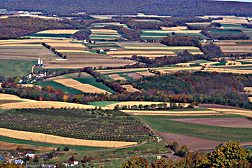This page has been archived and is being provided for reference purposes only. The page is no longer being updated, and therefore, links on the page may be invalid.
|
|
Two New CEAP Bibliographies Available Online
By Len CareyOctober 11, 2006
The U.S. Department of Agriculture has published two more in a series of current literature surveys covering agricultural conservation programs and the effectiveness of agricultural conservation practices.
The two new bibliographies, both available on the Web, were published by the National Agricultural Library (NAL), part of USDA's Agricultural Research Service (ARS).
The first new bibliography is "Environmental Effects of Conservation Practices on Grazing Lands," a guide to recent scientific literature covering environmental effects of conservation practices on grazing lands. This information is useful in designing policies and on-the-land conservation systems that foster practical and environmentally sound grazing practices.
The second bibliography is "Wetlands in Agricultural Landscapes," a guide to recent scientific literature covering environmental aspects of wetlands in agricultural landscapes. The bibliography highlights research findings in two main areas: (1) the effect of conservation practices and other agricultural activities on wetlands, and (2) the environmental effects of wetlands as conservation practices, including constructing and restoring wetlands.
This bibliography will also facilitate the identification of knowledge gaps regarding effects of conservation practices on ecosystem services provided by wetlands in agricultural landscapes, and will help identify where research is needed.
The two new publications are in addition to four CEAP bibliographies published by NAL in 2004 and made available on the Web. See story (/is/pr/2004/041006.2.htm) for details.
Altogether, the six bibliographies contain more than 5,200 citations with abstracts, where available, and with URLs when the documents are freely available online.
The series of bibliographies has been prepared by the NAL's Water Quality Information Center, in support of the USDA Conservation Effects Assessment Project (CEAP). Through CEAP, USDA is studying the environmental benefits of conservation practices implemented through various USDA conservation programs.
ARS is USDA's chief scientific research agency.

